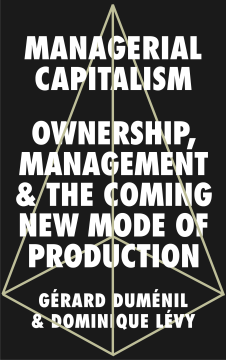
Additional Information
Book Details
Abstract
The debate around growing inequality is raging amongst economists, and Marxists are finding new ways to map-out the modern economy. Managerial Capitalism introduces a new way of understanding the changing structure of our economy through the emergence and behaviour of a new class – managers.
In the post war years as social democracy reigned, managers tended to form compromises with workers. However, under neoliberalism, allegiances have shifted. Today, a new alliance is forming between managers and capitalist owners, changing the nature of the hierarchy of power under capitalism. Additionally, the authors argue, this is happening much faster and universally than was previously thought.
By applying Marx's basic concepts to the reality of the system today, through the use of extensive data sets as well as firmly rooting the argument in its historical context, Managerial Capitalism updates Marxism for the twenty-first century, through showing how the modes of production today are shaped by a new class, that must be understood if it is to be challenged.
'Every serious student of political economy will want to read Gerard Dumenil and Dominique Levy's masterful synthesis of Marxist method, contemporary Econo-physics, and their own theoretical and empirical work on the emergence of neoliberal managerial forms of capitalism on a global scale'
Duncan K. Foley, Leo Model Professor of Economics, New School for Social Research
Table of Contents
| Section Title | Page | Action | Price |
|---|---|---|---|
| Cover | Cover | ||
| Contents | v | ||
| List of Figures | x | ||
| List of Tables | xii | ||
| Introduction | 1 | ||
| 1. An Overview | 2 | ||
| Part I: Modes of Production and Classes | 7 | ||
| 2. Patterns of Income Distribution | 9 | ||
| 3. Marx's Theory of History | 19 | ||
| 4. Managers in Marx's Analysis | 34 | ||
| 5. Sociality and Class Societies | 41 | ||
| 6. Managerialism and Managerial Capitalism | 53 | ||
| 7. A Wealth of Alternative Interpretations | 62 | ||
| 8. Hybridization as Analytical Challenge | 71 | ||
| Part II: Twelve Decades of Managerial Capitalism | 85 | ||
| 9. Varying Trends of Inequality | 87 | ||
| 10. The Sequence of Social Orders | 96 | ||
| 11. Class and Imperial Power Structures | 118 | ||
| 12. The Politics of Social Change | 131 | ||
| 13. Tendencies, Crises, and Struggles | 144 | ||
| Part III: Past Attempts at the Inflection of Historical Dynamics | 155 | ||
| 14. Utopian Capitalism in Bourgeois Revolutions | 157 | ||
| 15. Utopian Socialism and Anarchism | 172 | ||
| 16. Self-Proclaimed Scientific Socialism | 183 | ||
| Part IV: Prospects for Human Emanicpation Within and Beyond Managerialisms | 199 | ||
| 17. The Economics and Politics of Managerialisms | 201 | ||
| 18. The Potential of Popular Struggle | 211 | ||
| Notes | 225 | ||
| Index | 244 |
